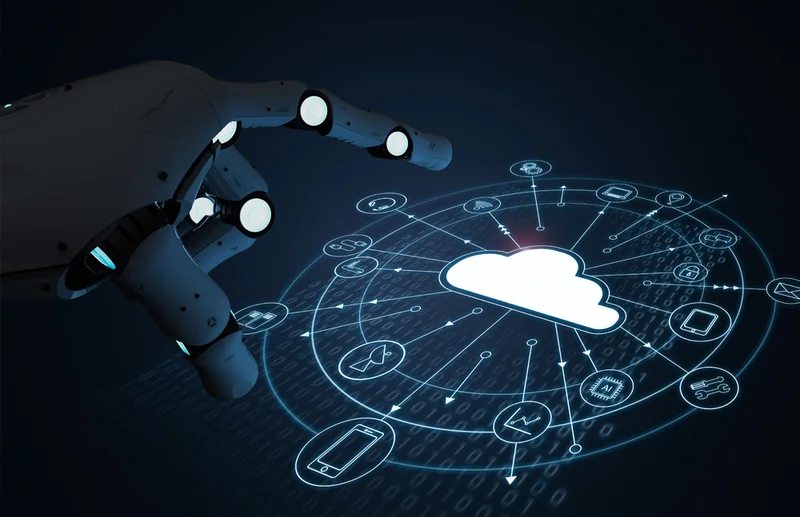AI and Cloud Computing are no longer separate innovations. They work in concert to create a potent synergy that propels intelligence, creativity, and scalability across industries. Businesses can process large datasets, provide more intelligent services, and swiftly react thanks to this combination of AI-powered cloud technologies. Together, cloud-based AI and AI in cloud tech are changing how companies function and expand in the age of digital transformation. Let’s explore with Metti the improvements that AI and Cloud Computing will bring in the near future.
Understanding AI and Cloud Computing
It’s crucial to comprehend each technology separately before looking into how they can work together.
What is Cloud Computing?
Cloud computing is the delivery of computing services—such as cloud storage, virtual servers, and cloud architecture—over the internet. Businesses use on-demand access to shared resources that scale as needed, rather than making significant investments in physical infrastructure.

Cloud services are typically divided into three models:
- IaaS (Infrastructure-as-a-Service): Offers virtualized infrastructure like servers and networking.
- PaaS (Platform-as-a-Service): Provides developers with platforms to build, test, and deploy applications.
- SaaS (Software-as-a-Service): Delivers ready-to-use applications hosted in the cloud.
These models form the foundation of the modern cloud ecosystem.
What is Artificial Intelligence (AI)?

Artificial Intelligence refers to technologies that allow machines to mimic human intelligence. It uses natural language processing (NLP), machine learning, and deep learning to assist systems in identifying patterns, forecasting outcomes, and adapting over time.
Businesses can use AI algorithms, neural networks, and sophisticated AI models to increase automation, analytics, and decision-making.
How AI and Cloud Computing Work Together
When integrated, AI and the cloud complement each other perfectly.
Cloud as the AI Infrastructure Backbone
Significant processing power, scalability, and elastic resources are needed to run AI workloads. Cloud platforms serve as the backbone of the infrastructure, facilitating cloud orchestration, model training pipelines, and extensive data preprocessing. Without having to pay for real data centers, developers may access resources from around the world.
AI for Optimizing Cloud Performance
AI improves cloud systems by increasing their adaptability. Auto-scaling, load balancing, and cloud automation are made possible by predictive analytics, which guarantees that apps operate smoothly and effectively. AI reduces downtime and maximizes resource allocation by anticipating consumption patterns, which makes the cloud more intelligent and economical.
Key Benefits of AI-Powered Cloud Solutions

Businesses benefit greatly from the combination of AI and cloud computing:
- Cost efficiency: Intelligent automation minimizes wasteful spending by optimizing resource consumption.
- Faster deployment: Cloud platforms with AI support accelerate application launches.
- Improved analytics: Business intelligence is created from raw data through AI-driven insights.
- Better security: AI monitoring tools immediately identify irregularities and stop threats.
Stronger resilience, more strategic decision-making, and wiser operations are the results of this combination.
Real-World Applications of AI in Cloud Computing

- Smart Data Analytics Platforms: Cloud-native AI is used by businesses to forecast business outcomes, analyze large data, and find hidden patterns.
- AI-driven Cybersecurity in the Cloud: Through the monitoring of suspicious activities and the prevention of breaches before they happen, AI-powered threat detection improves cloud security.
- Personalized Customer Experiences in SaaS: Businesses use chatbots, recommendation engines, and automated onboarding systems to deliver individualized experiences by integrating AI into SaaS platforms.
- Automated IT Operations (AIOps): AI is used by AIOps to manage IT infrastructure by automating performance optimization, monitoring, and troubleshooting. Increased uptime and more dependable services are thus guaranteed.
Industry Use Cases
The impact of AI and cloud computing can be seen across many industries:
- Healthcare: AI-enabled cloud platforms facilitate patient monitoring, medical imaging, and telemedicine, resulting in quicker and more precise diagnosis.
- Finance: AI is used by banks in cloud environments for risk modeling, fraud detection, and real-time transaction monitoring.
- Manufacturing: Cloud AI-powered predictive maintenance saves maintenance expenses and downtime.
- Retail: Cloud platforms that use AI to personalize retail experiences, increasing sales and customer engagement.
These illustrations demonstrate how AI-cloud integration is providing real-world advantages to many businesses.
Challenges in Integrating AI and Cloud Computing

While the advantages are clear, several challenges must be addressed:
- Data privacy: Protecting sensitive information stored in the cloud remains a critical concern.
- Model explainability: Decisions made by AI can be complicated, and transparency is necessary for compliance and trust.
- Regulatory compliance: Using AI in the cloud requires that organizations comply with regulations such as GDPR and HIPAA.
- Latency issues: Time-sensitive applications may suffer from delays in data processing.
These difficulties emphasize the significance of strong cloud compliance frameworks, hybrid solutions, and AI governance.
AI and Cloud Computing Trends to Watch
The future of AI in the cloud is being shaped by groundbreaking trends:
- Edge AI + cloud integration: Real-time performance is enhanced by processing data closer to users.
- Quantum computing in cloud AI: Unlocking new capabilities for solving complex problems.
- AI-as-a-Service (AIaaS): Making advanced AI accessible without in-house expertise.
- Generative AI in cloud platforms: Driving innovation in content creation, design, and automation.
These developments are broadening the scope of what is feasible and increasing the adoption of AI-cloud solutions.
The Future of AI and Cloud Computing
Looking ahead, AI and cloud computing will continue to be key to digital transformation. Businesses can expect wider enterprise usage, next-generation AI technology, and cloud ecosystems that are prepared for the future. Adopting this combination will give businesses a competitive advantage in terms of productivity, creativity, and customer satisfaction.
In the future, cloud environments will likely be intelligent and flexible, supporting corporate operations while also actively promoting expansion.
Conclusion
One of the biggest changes in contemporary technology is the combination of AI and cloud computing. Organizations can save money, improve customer experiences, and strengthen security by fusing the intelligence of AI with the scalability of the cloud.
The key takeaway is clear: companies that invest in AI-powered cloud solutions today are not just preparing for the future—they are actively shaping it.
CONTACT
